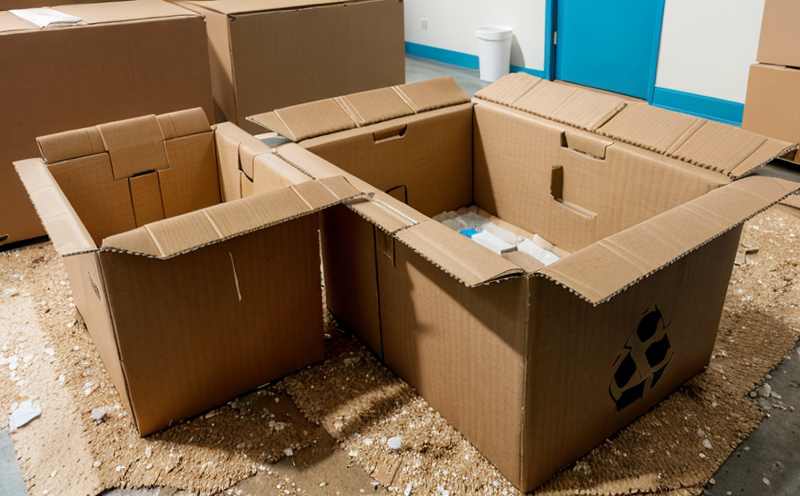ISO 11093-8 Recycled Board Delamination Resistance
The ISO 11093-8 standard is a pivotal benchmark for evaluating the delamination resistance of recycled paperboard. This test method assesses the cohesive strength between layers of recycled board, ensuring that these materials meet stringent quality and performance criteria in various applications.
Delamination can be detrimental to the integrity of recycled board products, leading to reduced performance and increased waste in downstream processes. By adhering to ISO 11093-8, manufacturers can ensure their products are robust and reliable, thereby enhancing customer satisfaction and market competitiveness.
The test procedure involves subjecting a sample of recycled paperboard to controlled conditions that simulate real-world stressors. This process helps identify potential weaknesses in the material structure, enabling timely corrective actions if necessary. Compliance with this standard is crucial for industries reliant on high-quality recycled board products such as corrugated containers, packaging materials, and other structural components.
Accurate specimen preparation is critical to obtaining reliable results from ISO 11093-8 testing. Specimens are typically cut into specific dimensions according to the standard’s requirements, ensuring uniformity across all samples. Proper conditioning of specimens before testing is also essential; this involves maintaining controlled temperature and humidity levels for a specified period.
The testing apparatus used in ISO 11093-8 includes specialized machines designed to apply defined loads at specific rates. These instruments measure the force required to separate adjacent layers of recycled board, providing quantifiable data on delamination resistance. The results are then analyzed based on pre-defined acceptance criteria outlined within the standard.
Compliance with ISO 11093-8 is particularly important for companies operating in sectors that demand high-performance recycled materials. For instance, packaging manufacturers must ensure their products can withstand transportation and storage conditions without compromising functionality or integrity. Similarly, corrugated box producers need to guarantee their boxes maintain structural stability throughout use.
Non-compliance with ISO 11093-8 could lead to substandard product performance, increased waste generation during manufacturing processes, and potential reputational damage for brands relying heavily on recycled content. Therefore, implementing rigorous quality control measures and adhering strictly to industry standards like ISO 11093-8 is essential for maintaining consistent product quality.
Quality managers, compliance officers, R&D engineers, and procurement professionals play key roles in ensuring adherence to these standards. Regular monitoring of production processes against established benchmarks helps maintain optimal performance levels while minimizing risks associated with non-compliance.
Applied Standards
The ISO 11093-8 standard is part of a broader family of specifications that address various aspects of recycled paperboard and its applications. Other relevant standards include ISO 527, which covers the mechanical testing methods for thermoplastics; ISO 649, focusing on physical properties of coated or uncoated paper; and ISO 10378, dealing with moisture sorption characteristics.
These international standards provide comprehensive guidelines across different material types and applications, ensuring consistent quality and performance metrics within the industry. By aligning their testing procedures with these recognized benchmarks, laboratories like Eurolab can offer reliable and accurate assessments of recycled paperboard properties.
Industry Applications
The application of ISO 11093-8 is particularly significant in industries where recycled content plays a crucial role. Packaging manufacturers, for example, benefit greatly from this standard as it ensures their corrugated boxes and other packaging components can withstand the rigors of distribution channels without delaminating.
Similarly, pulp and paper mills that produce recycled board need to verify the cohesion strength between layers during manufacturing processes. Ensuring compliance with ISO 11093-8 helps prevent costly rework and ensures product consistency across batches.
The standard also finds relevance in sectors like construction materials where recycled paperboard is used for insulation purposes. In such cases, maintaining robust delamination resistance is vital to guarantee effective thermal insulation properties.
Eurolab Advantages
At Eurolab, we pride ourselves on offering comprehensive and accurate testing services that meet the highest industry standards. Our expertise lies in providing precise evaluations of recycled paperboard delamination resistance using ISO 11093-8.
We employ state-of-the-art equipment and highly trained personnel to ensure every test conducted adheres rigorously to international guidelines. This commitment ensures reliable data that can be trusted by our clients for making informed decisions regarding their products.
Our experienced team understands the nuances of recycled board manufacturing processes, allowing us to offer tailored solutions based on specific client requirements. Whether you need assistance with specimen preparation or interpretation of test results, Eurolab is here to support your quality assurance initiatives.





